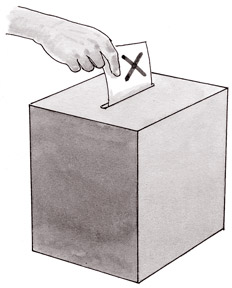Most memorable vote in North since 1977
 As voters go to place their ballots in the current phase of the Local
Government elections, most eyes, especially those overseas, have been
focused on the hustings in the North of the country. As voters go to place their ballots in the current phase of the Local
Government elections, most eyes, especially those overseas, have been
focused on the hustings in the North of the country.
These are the first democratic Local Government elections being held
without the threat of intimidation by the Liberation Tigers of Tamil
Eelam since 1982. They are also the first since the end of the civil
conflict two years ago.
Readers will probably remember a previous election in the Peninsula,
when party lists won entire Pradeshiya Sabhas with as few as seven
votes, because the voters were kept away by the LTTE threats.
The day on which the elections are being held is also significant. On
this day, 28 years ago, Sri Lanka's nightmare began with a bang which
resonated around the world.
The world generally dates what came to be known (thanks mainly to
journalist Mervyn de Silva) as the 'Eelam War', from July 23, 1983. It
was on this day that Velupillai Prabhakaran and his henchmen ambushed
the Sri Lanka Light Infantry's convoy 'Four Four Bravo' at Thirunelveli.
Military operation

From the LTTE point of view, this was an important event. It was the
first time they detonated an Improvised Explosive Device in conjunction
with an ambush. It was also their first real military operation -
previous actions had been confined to robberies, murders and attacks on
Police stations.
It was also important in that this action pushed the LTTE into the
position of primus inter pares among Eelamist militant groups - a
position which had hitherto been held by Prabhakaran's bete noire and
the target of much of his criminal activity, Uma Maheswaran's PLOTE.
Even more importantly, it provided the extremists in JR Jayewardene's
government with a pretext for the Black July pogrom, in which innocent
Tamil civilians all over the country were targeted by government thugs.
In broad daylight, Tamil people were murdered. The Police and Army
had orders not to interfere. Non-Tamils who sheltered Tamils received
death threats.
Ethnic tension
There was unprecedented looting as Tamil shops and houses were
plundered and set on fire. A cartoon in the 'Aththa' paper of the time
summed it all up: one thug tells another thug 'when I see all the goods
in that shop, I feel my patriotism rising'.
Black July also proved a disaster for the Sri Lankan national idea
among Tamils. It created a massive support base overseas for the LTTE's
operations in a huge diaspora of embittered Tamils fleeing what they saw
as Sinhalese persecution.
In actual fact, most Sinhalese people were appalled at the death and
destruction. The pogrom was less an expression of ethnic tension than of
state violence, the culmination of a series of attacks on opponents
among the populace as a whole.
It all started on July 23, 1977 when JR Jayewardene was sworn in as
Prime Minister of this country. Before the election he had promised he
would 'give the Police a holiday' and this is what he proceeded to do,
establishing a pattern of violence which was to be the hallmark of his
rule.
Jayewardene's goondas, using government vehicles went around
strongholds of the SLFP and the Left attacking supporters of his
opponents, destroying their homes. The Police did not intervene.
Political violence
In particular, these blackshirts targeted Attangalla, Yatiyantota,
Dompe and Ruwanwella. In Kegalle district alone some 9,000 families were
rendered homeless. Thousands went into hiding in jungles and plantations
all around the country.
After about three weeks of this political violence, the goondas
turned their attention to Tamils. Fifty thousand Tamil people were
rendered homeless and about 300 were killed.
Although the ferocity of the second series of riots was less than the
first, 'the riots of 1977' are generally perceived as ethnic, when in
reality they were primarily aimed at silencing the opponents of the
regime, be they Sinhalese, Tamil or Muslim.
The pattern was repeated in 1979, during the General Strike of 1980
and during the Jaffna DDC elections. The Presidential Election and the
infamous referendum of 1982 were marked by unprecedented electoral
violence, with thugs taking over entire polling booths.
It is in this context that we must look upon the Local Government
Elections of July 23, 2011. Voters can go to the polls confident that
they can exercise freely their democratic right to elect their own
councillors.
For the first time since 1977, the people of the North and East are,
by and large, free from violence, whether sponsored by the state or by
terrorists.
It does not really matter who wins these elections - whoever ends up
getting elected, they will have been put there by the people themselves.
It will be a victory of the people.
It is surely the hope of all decent people that this people's victory
of July 23, 2011 will put paid finally to the dreadful cycle of violence
and loss of freedom begun on July 23, 1977 and punctuated by the events
of July 23, 1983. |



